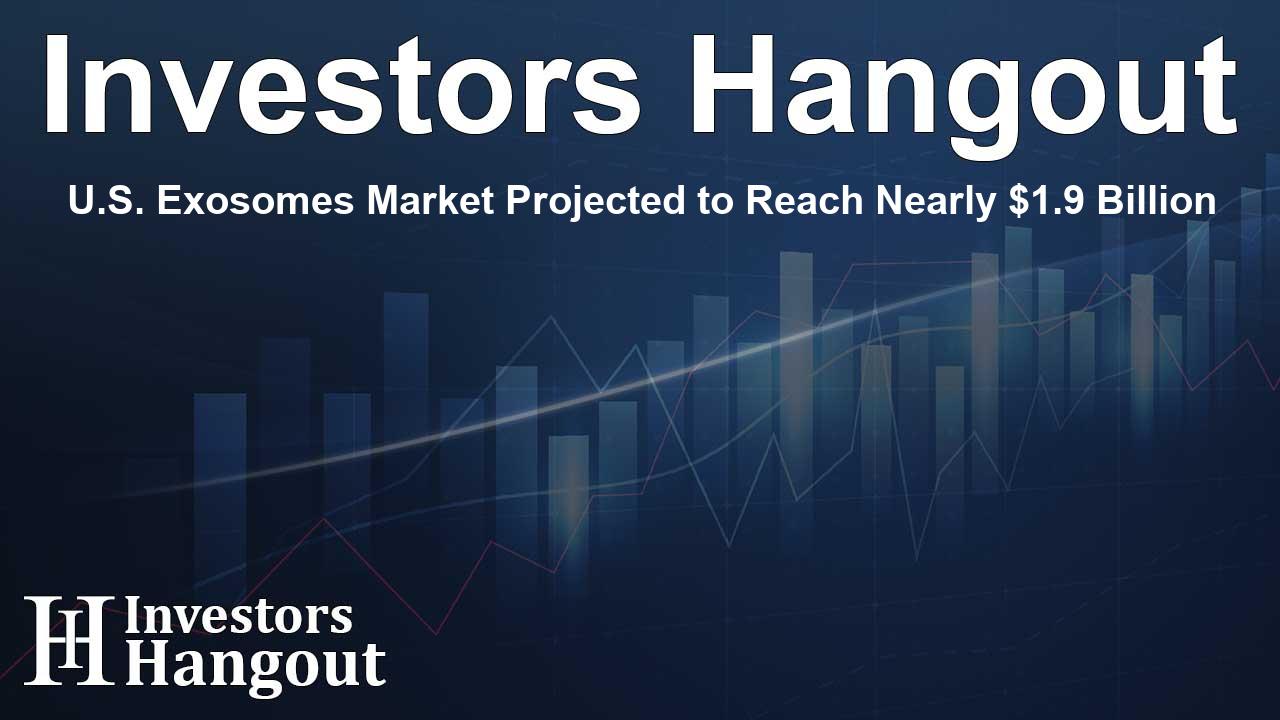U.S. Exosomes Market Projected to Reach Nearly $1.9 Billion

The Future of the U.S. Exosomes Market
The U.S. exosomes market is on the brink of monumental growth, with projected values set to escalate from approximately $101 million to nearly $1.9 billion in the coming years. This forecast reflects the accelerating research and clinical applications of exosomes within the healthcare sector. Recent studies indicate that the potential of exosomes in diagnostics, therapeutics, and drug delivery systems positions them at the forefront of medical advancements.
Understanding Exosomes
Exosomes are tiny extracellular vesicles, about 100 nanometers in diameter, produced by eukaryotic cells. They serve as crucial messengers in intercellular communication, carrying proteins, lipids, RNA, and other molecules. This biological significance opens avenues for exosomes to act as biomarkers for various diseases, including cancer, and as vehicles for targeted drug delivery. The therapeutic and diagnostic applications of exosomes are set to revolutionize the management of chronic conditions.
Exosomes in Cancer Treatment
One of the most promising applications of exosomes is in cancer therapies. With cancer diagnoses projected to exceed two million new cases in the near future, the demand for innovative solutions is high. Exosomes can be utilized as biomarkers for cancer detection and as delivery systems for therapeutic agents, enhancing the efficacy of cancer treatments. Their role in cancer vaccines is another critical area where they help stimulate an immune response against tumors.
Research and Development Trends
The landscape of exosome-related research is rapidly evolving. Continuous studies are uncovering novel applications, leading to advances in isolation and extraction methodologies. As researchers explore the complexities of diseases, exosomes have emerged as tools not just for treatment but also for understanding disease progression.
Current Challenges in the Market
Despite the favorable outlook for the U.S. exosomes market, several challenges exist. A significant barrier is the lack of standardized techniques for exosome isolation and characterization. Current methods, such as ultracentrifugation, can be cumbersome and often result in contamination with other extracellular vesicles. Furthermore, stability issues related to exosomes, like their short half-life and propensity to aggregate, complicate their clinical applications, making scalability a challenge.
Opportunities Through Technological Advancements
Technological advancements in genetic editing present significant opportunities within the exosomes market. Innovations such as click chemistry and targeted gene modification have enabled researchers to refine exosome functions, thereby enhancing their therapeutic potentials. This progress translates into improved specificity and stability for treatment protocols, which can lead to better patient outcomes in the long run.
Highlighting Recent Developments
In the realm of innovation, notable breakthroughs have surfaced. For instance, researchers have developed methods to modify exosomes effectively, enhancing their targeting capabilities in cancer therapies. Moreover, collaborative efforts between academia and industry are potentially paving the way for novel products and approaches.
Geographical Insights and Regulatory Landscape
The U.S. stands as a hub for exosome research, driven by an increasing number of clinical trials focused on exosome applications in various therapeutic contexts. However, the lack of FDA-approved exosome products remains a hurdle. Nevertheless, ongoing governmental support and investment into exosome research foster a conducive environment for market growth, supported by numerous biotech startups focusing on this innovative field.
Conclusion
As the U.S. exosomes market continues to evolve, the integration of technological advancements and research breakthroughs will be critical in unlocking the full potential of exosomes in healthcare. Companies engaged in this market will likely play a significant role in transforming therapeutic strategies and improving patient care through innovative exosome-based solutions.
Frequently Asked Questions
What are exosomes and why are they important?
Exosomes are small vesicles that facilitate communication between cells and hold potential as biomarkers and delivery systems for therapies, especially in cancer.
How is the U.S. exosomes market expected to grow?
The U.S. exosomes market is projected to grow from around $101 million to nearly $1.9 billion driven by increasing applications in medicine.
What challenges does the exosomes market face?
Challenges include the lack of standardized isolation techniques and stability issues, which can hinder clinical applications.
What role does technology play in the advancement of exosomes?
Recent advancements in gene editing and other technologies enhance the precision and effectiveness of exosomes in therapeutic applications.
Are there prominent companies leading the U.S. exosomes market?
Yes, several leading companies are driving innovation in the exosomes space, contributing to research and development initiatives.
About The Author
Contact Addison Perry privately here. Or send an email with ATTN: Addison Perry as the subject to contact@investorshangout.com.
About Investors Hangout
Investors Hangout is a leading online stock forum for financial discussion and learning, offering a wide range of free tools and resources. It draws in traders of all levels, who exchange market knowledge, investigate trading tactics, and keep an eye on industry developments in real time. Featuring financial articles, stock message boards, quotes, charts, company profiles, and live news updates. Through cooperative learning and a wealth of informational resources, it helps users from novices creating their first portfolios to experts honing their techniques. Join Investors Hangout today: https://investorshangout.com/
The content of this article is based on factual, publicly available information and does not represent legal, financial, or investment advice. Investors Hangout does not offer financial advice, and the author is not a licensed financial advisor. Consult a qualified advisor before making any financial or investment decisions based on this article. This article should not be considered advice to purchase, sell, or hold any securities or other investments. If any of the material provided here is inaccurate, please contact us for corrections.
